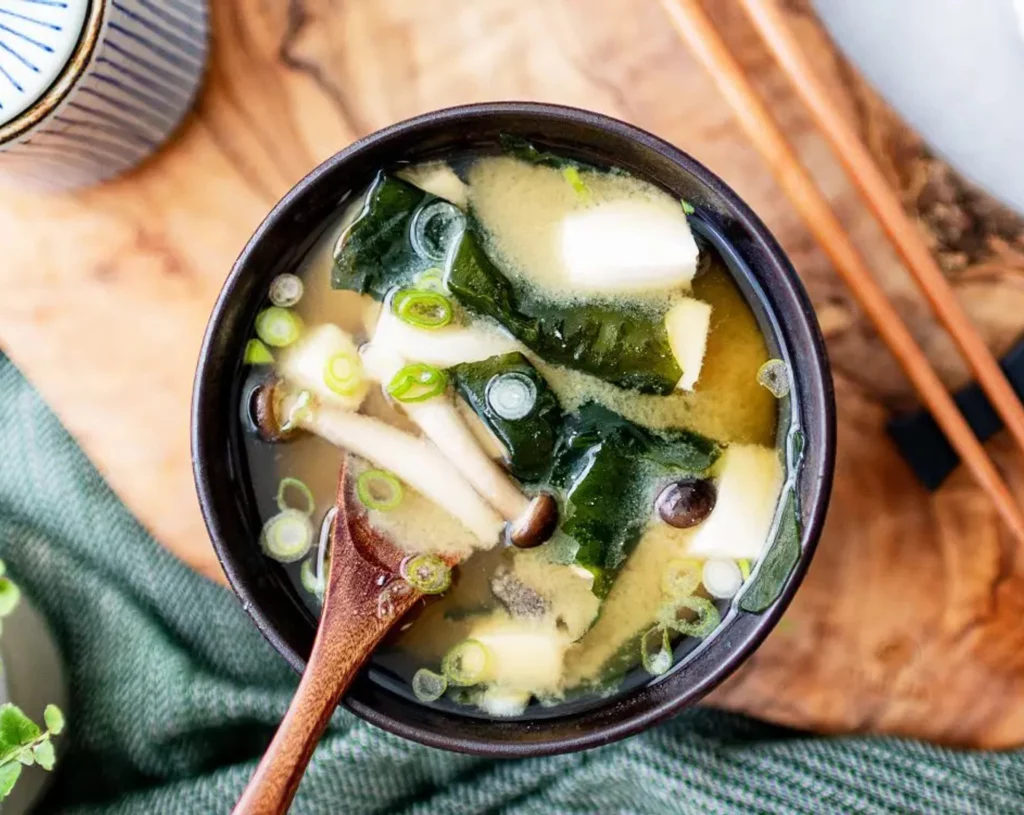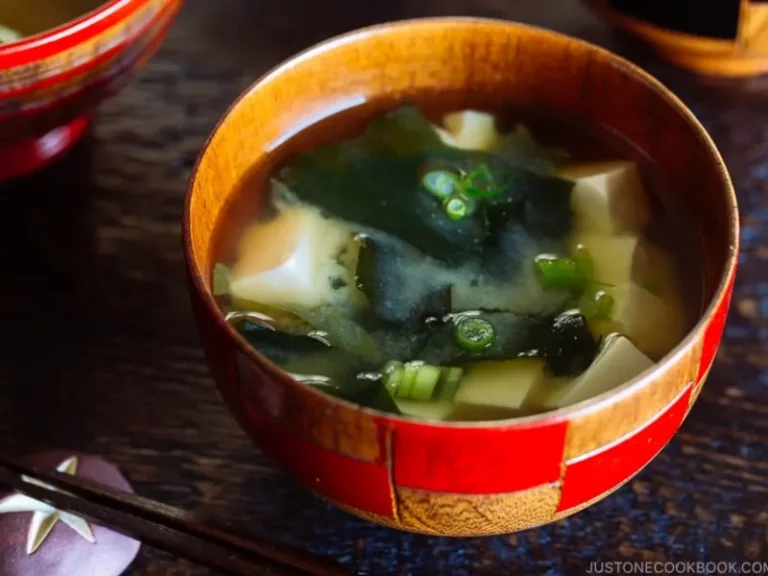
There is nothing better than going home after a long rainy day and treating yourself to a delicious miso soup. Typical of Japanese cuisine, this dish has been around for centuries. Miso soup consists of a dashi stock in which miso paste has been mixed and to which a variety of ingredients, such as tofu and rice, are often added. But is miso soup vegan-friendly?
Veganism is a lifestyle that aims to reduce the usage of animal-derived products, including food, clothes, and other items such as cosmetics. This lifestyle is adopted by people who find the current way we treat animals highly immoral. Concerning their diet, vegans only opt for plant-based products, avoiding ingredients containing dairy, meat, fish, eggs, and all other items that may be connected to animal cruelty.
Following this diet requires lots of research and this is why we decided to help vegans by discussing several popular dishes and whether or not they are suitable for their lifestyle. Today we will talk about a traditional Japanese dish now extremely popular in the Western world, miso soup. So, let’s dive into this topic!
Table of Contents
Ingredients in miso soup
Traditionally, miso soups are made from dashi stock and miso paste to which other plant-based ingredients, such as tofu, wakame seaweed, green onions, and daikon, are also added. So, is miso soup vegan? Unfortunately, not. This soup can be served with ingredients that are not suitable for a plant-based diet, such as shrimp, fish, clams, and pork. But these are not the only products you should watch out for.
In fact, miso soup is made from dashi, a soup stock produced by simmering water containing kombu, a type of kelp, and kezurikatsuo, shavings of dried skipjack tuna.
Obviously, this ingredient is not vegan, but there are several vegan-friendly alternatives now available on the market. For instance, kombu dashi, made by using only dry kelp.
Some people also use dried shiitake mushrooms to replace the fish taste. But let’s move forward. Of course, the main ingredient in miso soup is miso paste. This is completely vegan as it is made from cooked soybeans, koji, fermented rice, and salt. Bonito flakes are another common ingredient. These are often added to miso soups as toppings. They, unfortunately, contain fish and are therefore not suitable for vegans. However, they are not fundamental and can be easily avoided or replaced with shiitake mushrooms.
Let’s also talk about soy sauce briefly. Often present in miso soups, this ingredient is vegan in theory, but some manufacturers use flavor enhancers containing fish or meat. Last but not least, tofu and seaweed. Luckily, these ingredients are completely vegan and provide us with huge amounts of proteins.
Nutritional value of miso soup
Miso soup is very healthy and some of its benefits include improved digestive health, lower risks of heart diseases, as well as a healthier immune system. But what are the nutritional values of this dish? Miso soup contains roughly three grams of proteins per serving (one ounce). This meal is also a great source of probiotics, minerals, and vitamins, containing A. oryzae, known for improving gut health, vitamin K, manganese, zinc, and calcium.
Miso soup is also low in calories, with only 40 to 60 calories per serving. This is significantly less than other popular vegan soups such as leek and potato soup.
Miso soup and veganism
One of the most common misconceptions about miso soup and more generally Japanese cuisine is that it is mostly vegan, but this is not the case. Miso soup is, in fact, made from dashi, an ingredient produced from dried skipjack tuna. On top of this, this traditional dish often includes other ingredients, such as bonito flakes and soy sauce that may contain animal products.
Luckily, nowadays, thanks to the rise of veganism several restaurants offer vegan-friendly miso soup variants. If you cannot find any in your area, you can always make your own version, opting for shiitake mushrooms instead of bonito flakes and using kombu dashi, which avoids the usage of fish. This will help you recreate a delicious miso soup full of umami taste, a typical flavor found in this dish.
Miso soup and Japanese cuisine
Miso soup is one of the most popular dishes in Japanese cuisine and it is a fundamental part of this country’s food tradition. According to legends, this dish was eaten by samurais during the Kamakura period, stretching from 1185 to 1333. This dish is still incredibly popular in this country and it is consumed daily by three-quarters of the Japanese population.
Miso soup comes in two main variants, depending on the miso paste used. Red miso paste is higher in soybeans and is strongly flavored, while white miso soup is milder.
Make your own vegan Miso soup

Unfortunately, traditional miso soup is not vegan, but you can easily make your own plant-based soup, as we mentioned above. If, on the other hand, you prefer to try a traditionally vegan Japanese dish, you can opt for stir-fried udon noodles, tofu, or ramen. Keep in mind that, compared to these, miso soup is lower in calories, making it the perfect dish for those wanting to lose weight.
Conclusion
Miso soup is unfortunately not suitable for vegans, as it contains dashi broth produced with fish. This dish is also often topped with bonito flakes, which are also made from fish. But there is no reason to despair. Nowadays, several restaurants are offering vegan-friendly miso soups.
On top of this, making your vegan version is relatively easy, so roll up your sleeves and make your own cozy miso soup at home. Use shiitake mushrooms instead of bonito flakes and simply opt for dashi which was simmered in kelp only. We are sure you will fall in love with this easy soup! If you suddenly can’t do without Japanese healthy recipes, try other vegan dishes typical from this country, such as ramen, udon noodles, natto, soba, and edamame.
Frequently Asked Questions
What is miso soup, and is it vegan-friendly?
Miso soup is a typical Japanese dish. Unfortunately, it is not vegan as it contains dashi, produced using fish.
What are the ingredients in miso soup, and which ones are not vegan-friendly?
Miso soup is made from miso paste and dashi. Unfortunately, the latter is not vegan-friendly.
Can vegans consume traditional miso soup, or are there vegan alternatives?
No, vegans cannot consume miso soup. However, you can easily make your own plant-based alternative by avoiding dashi and using vegetable stock.
Is Miso soup a good source of nutrition for vegans?
Miso soup is highly healthy as it contains several probiotics and minerals. However, it is not suitable for a vegan diet.
How does miso soup fit into a vegan diet?
Miso soup is not vegan as it contains dashi, an ingredient made from fish.
Are there any misconceptions about miso soup and veganism?
People often believe that miso soup is vegan as it does not contain dairy, meat, or fish. However, this dish is made from dashi, an ingredient produced with fish.
What are some vegan-friendly miso soup recipes?
Simply use a vegan stock instead of dashi or make your own vegan version by simmering water in kelp.
How does Miso soup fit into Japanese cuisine, and are there other vegan Japanese dishes?
Miso soup is one of the most popular dishes in Japan and has been around for centuries. Unfortunately, this soup is not vegan. Some Japanese vegan dishes include ramen, soba, and natto.
Can vegetarians consume miso soup?
No. Traditional miso soup contains dashi which is made from fish.
Is miso soup gluten-free?
This depends on how the miso paste has been fermented. If it was produced using soybeans then your miso soup will be gluten-free.



